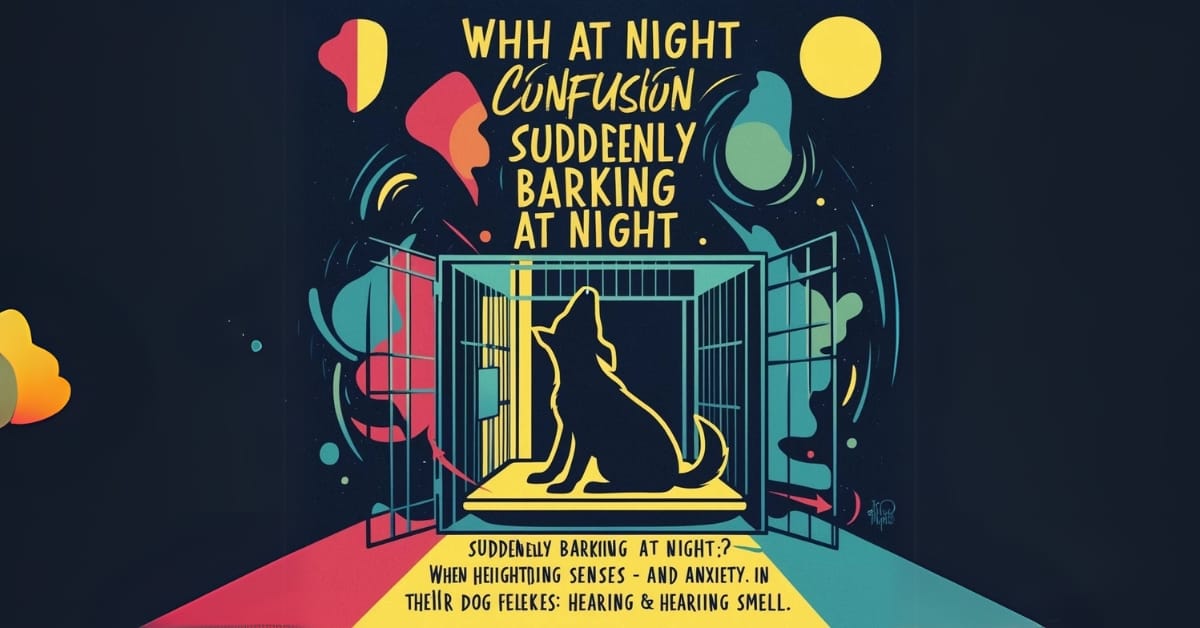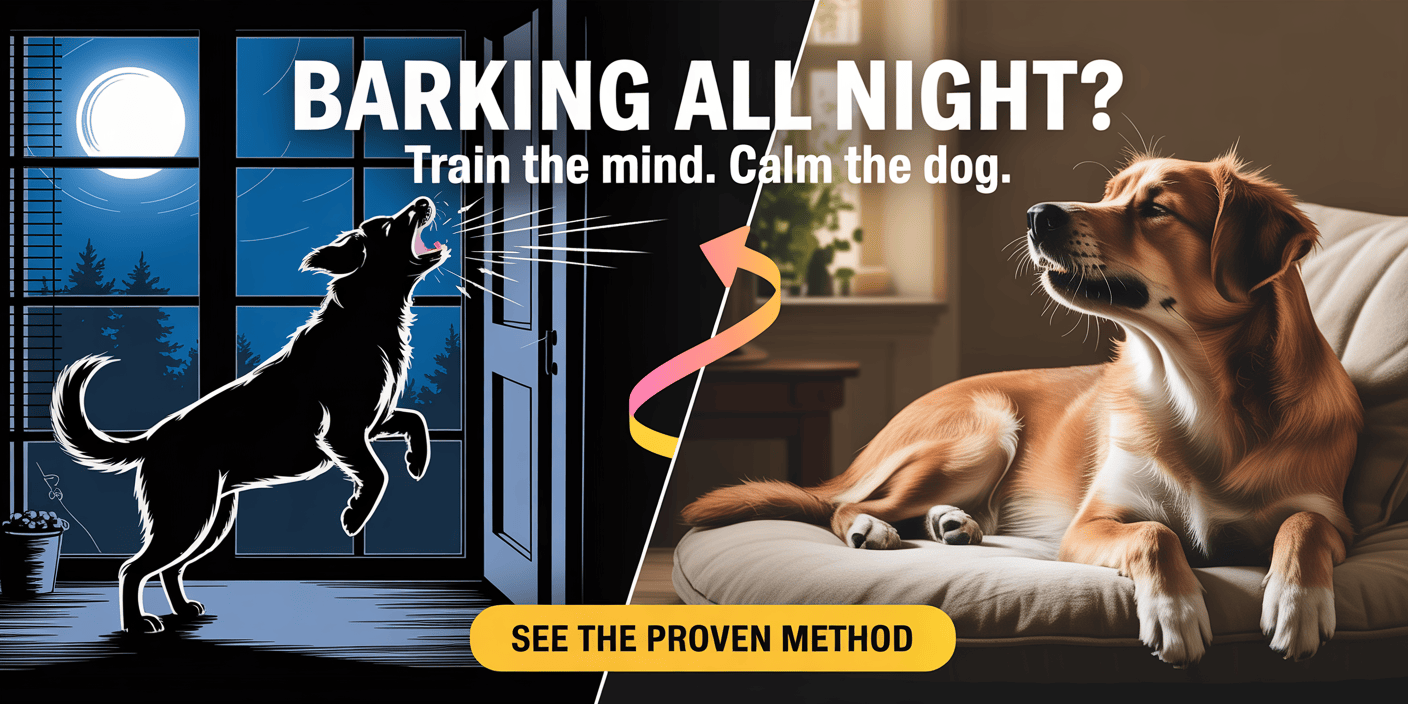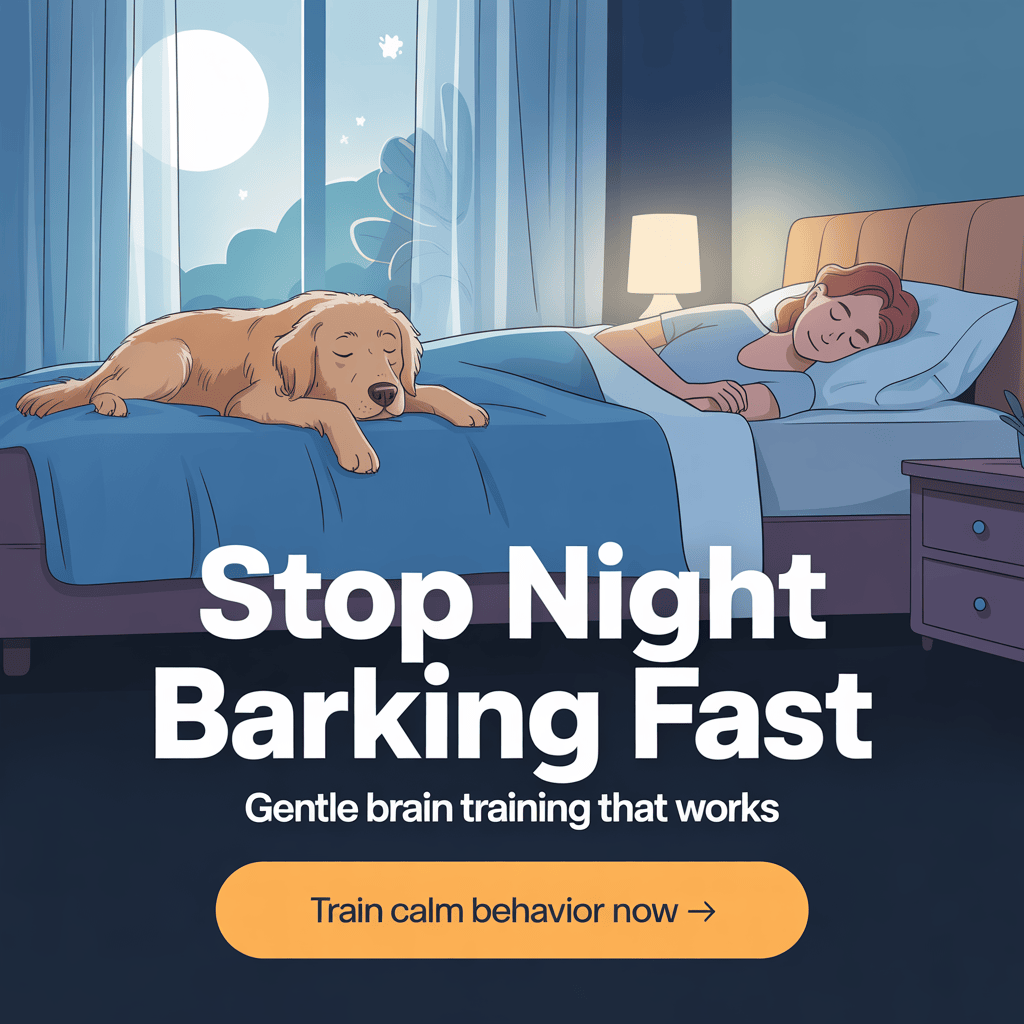Being a devoted dog owner means we share a deep bond with our furry friends. They show us loyalty and love without condition. But when their barking interrupts our night, it can be frustrating and disrupt our sleep. So, how to calm a barking dog at night?
If you’re dealing with a barking dog at night, you’re not alone. Many pet owners have faced this issue. With the right approach, you can make your nights peaceful again. This will help you and your dog get the rest you both need.
This guide will cover why dogs bark at night and offer easy solutions to stop it. By understanding the causes and using proven methods, you can enjoy quiet nights. You’ll learn how to calm your dog and get peaceful sleep.
Key Takeaways
- Discover the common triggers that lead to nighttime barking in dogs.
- Learn practical and gentle methods to soothe your dog’s anxiety and promote peaceful sleep.
- Understand the importance of creating a calming environment and establishing a consistent routine.
- Explore techniques to combat boredom and provide mental stimulation for your furry friend.
- Recognise the signs of separation anxiety and how to address it through gradual desensitisation.
Understanding the Reasons Behind Nighttime Barking
Dogs may bark at night for many reasons, like fear, boredom, and attention-seeking. It’s important to know why they bark to fix the problem.
Fear-Related Barking
Strange sounds can scare dogs, making them bark to protect themselves. Dogs can hear sounds from much farther away than humans. This means they might bark at night because they think there’s a threat.
Boredom and Lack of Stimulation
Bored dogs might bark because they need something to do. If they don’t get enough play or activities during the day, they might bark at night. This is their way of trying to have fun or find something interesting.
Attention-Seeking Barking
Some dogs bark at night to get their owner’s attention. This can happen more in areas with lots of dogs, as they bark to alert others to potential dangers. In the UK, dogs that bark too much can cause problems for their owners, even leading to fines.
Knowing what triggers your dog’s barking, like fear, boredom, or wanting attention, helps you find the right way to stop it.
“Understanding the root causes of your dog’s nighttime barking is the first step towards finding a long-term solution.”
Creating a Calming Environment
Creating a calm sleep space is key to stopping your dog from barking at night. By making the atmosphere soothing, you can ease your dog’s anxiety and help them sleep better.
First, give your dog a cosy and safe spot to sleep, away from loud noises and distractions. Use soft lighting, like dim nightlights, to make the room peaceful. Adding calming sounds, like white noise machines or gentle music, can also block out sounds that make your dog bark.
To cut down on distractions, try to limit your dog’s view and hearing of outside noises. This means closing curtains, turning off TVs, and keeping quiet at night.
- Use calming scents, such as lavender or chamomile, to make the space more relaxing.
- Consider getting a Thundershirt® or similar item to give your dog a gentle hug and comfort.
- Try natural supplements, like melatonin or valerian root, with your vet’s advice to calm your dog.
By making the environment calm and reducing distractions, your dog will likely feel more relaxed and bark less at night. Remember, every dog is different, so you might need to try a few things to see what works best for your dog.

Creating a peaceful sleep area is key to cutting down on your dog’s night barking. It helps both you and your dog get a good night’s sleep5.
Establishing a Consistent Routine
Consistency is key in managing your dog’s nighttime barking. A structured daily routine, including regular exercise, mealtimes, and a consistent bedtime ritual, gives your dog a sense of security and predictability. This predictability reduces anxiety and promotes relaxation, leading to peaceful sleep. By adding these elements to your dog’s life, you create a stable environment that supports their well-being and cuts down on nighttime barking.
The Power of Predictability
Dogs love predictability, and a consistent routine can calm their nighttime barking. A structured schedule lets your dog know what to expect, reducing the chance of sudden events that cause anxiety. By giving your dog a comfy sleeping spot and a consistent bedtime routine, you help them link certain cues with relaxation and sleep. This reduces their nighttime barking.
Dogs are all about habits, and routine is crucial for their well-being. A consistent schedule not only tackles the root of nighttime barking but also boosts your dog’s emotional and physical health.
“A structured daily routine provides dogs with a sense of security and predictability.”
| Benefits of a Consistent Schedule | How Routine Helps Reduce Nighttime Barking |
|---|---|
| Reduces anxiety and promotes relaxation. Supports overall well-being. Helps anticipate and prepare for activities | Reduces anxiety and promotes relaxation Supports overall well-being. Helps anticipate and prepare for activities |
By setting a consistent routine, you use predictability to calm your dog’s barking at night and create a peaceful environment. Remember, patience and dedication are important when starting these changes, as it might take time for your dog to adjust.
Desensitisation and Counter-Conditioning
If your dog barks at night due to fear, desensitisation and counter-conditioning can help. Dogs’ fears and shyness can come from their genes and be passed down. Instead of forcing them to face their fears, a step-by-step approach called desensitisation can help them feel better.
These techniques, used together, can change how fearful pets act. It’s important to use positive reinforcement to teach new behaviours. You can control how intense a stimulus is by changing its distance, volume, or speed while slowly introducing it to your dog.
Counterconditioning pairs a scary stimulus with something fun to change how dogs feel. It’s key to keep the dog calm enough to learn from positive experiences. Changing how a dog feels about something can take a while, often months.
For these techniques to work, you need to control the pet, use rewards, and manage the stimulus carefully. They can help with many fears, like loud noises or new situations. How comfortable the owner is with these exercises affects their success.
Owners liked citronella spray collars more than shock collars, with 89% satisfaction. The citronella collar stopped or reduced barking in 78% of dogs. Using these collars with training and supervision works well.

“Gradual exposure and positive reinforcement are key to helping a fearful dog overcome their anxiety.”
Combating Boredom and Mental Stimulation
Boredom can make dogs bark at night. It’s key to keep your dog busy with fun activities and exercise all day. Playing with interactive toys, using puzzle feeders, and training can make your dog tired and happy at night.
Interactive toys and puzzle feeders are great for fighting boredom and cutting down on night barking. They keep your dog’s mind sharp and encourage them to solve problems, which meets their instincts.
Exercise is super important for dogs. A tired dog sleeps more and doesn’t get into trouble. It’s important to know how much exercise your dog needs, so talk to a vet or a dog expert.
Training, playing dog sports, and making mealtime fun can also help with boredom and calmness at night. Dogs need something to do, like a job, to stay happy and well.
If you’re away for a long time, consider getting a dog walker, pet sitter, or putting your dog in daycare. This keeps your dog happy and less likely to bark at night.
Using exercise, fun activities, and enrichment can really help fight boredom and make your dog calmer and happier. This can greatly reduce night barking.
How to calm a barking dog at night
Dealing with a barking dog at night can be tough and frustrating. But there are ways to calm your dog and help you sleep better.
Start by making a calm sleep spot for your dog. This means giving them a cosy place to sleep, like a crate or a quiet corner. You can also use soft music, white noise, or calming essential oils.
Having a routine for your dog’s meals, exercise, and bedtime helps a lot. This makes sure they’re happy and calm at night.
For dogs that bark due to fear or anxiety, try desensitisation and counter-conditioning. Slowly introduce them to things that make them bark, like strange sounds or people. Reward them for staying calm, and they’ll learn to be less scared.
It’s important to keep your dog busy and happy during the day. A tired dog is less likely to bark at night. Try playing with them, doing training exercises, and giving them puzzle toys.
If your dog still won’t stop barking, you might need help from a vet or a dog behaviourist. They can find out why your dog is barking and help you fix it.
With patience and trying different things, you can calm your dog at night. This will make your home peaceful for you and your dog.

Separation Anxiety and Gradual Desensitisation
Separation anxiety can make dogs bark a lot at night. Dogs with this issue might bark and act upset within minutes of being left alone. Some dogs chew on things or destroy items when left by themselves. Pacing can also show that a dog has separation anxiety. To fix this, it’s key to use a step-by-step approach.
Building Confidence and Trust
Start by leaving your dog alone for short times and slowly make those times longer. Many dogs feel anxious when left alone, even if others are there. Giving them things like familiar smells or calming music can help calm them down. Things that might make a dog more likely to feel anxious include being left alone for the first time or big changes like a family member passing away.
By slowly building your dog’s trust, you can cut down on their nighttime barking. Dogs with separation anxiety might howl or bark a lot when left alone. This anxiety can start for many reasons, like being left alone for the first time or moving to a new home.
Dogs with a lot of anxiety might not be easily distracted by treats at first. To help them, you need to slowly get them used to being alone. Activities like playing fetch or solving puzzles can also help reduce their stress.
| Symptom | Severity | Recommended Approach |
|---|---|---|
| Mild Separation Anxiety | Excessive barking, whining, or howling | Counterconditioning methods can help reduce or resolve the issue. |
| Severe Separation Anxiety | Destructive behaviors, attempts to escape, incontinence | Destructive behaviours, attempts to escape, incontinence |
By following these steps, you can help your dog feel better and reduce nighttime barking. This will make your home more peaceful for everyone.
Positive Reinforcement: The Key to Success
Positive reinforcement is a great way to change your dog’s behaviour, such as stopping their nighttime barking. By rewarding them for being calm and quiet at night, you make a positive learning space. This encourages them to keep doing those good things. It also builds trust, strengthens your bond, and helps change their behaviour for good. Being consistent and patient is key to making this work.
It’s important to know why your dog barks to choose the right approach. If your dog has been barking a lot, it might take more time to change. But using positive reinforcement consistently can help them learn faster.
Using a calm voice to tell your dog to stop barking works well. But scolding them can make it worse and cause more problems. Shock collars are not good because they can hurt your dog’s feelings for a long time.
Keeping your dog active and busy can stop them from barking too much. Dogs bark for a reason, so finding out why is important to fix the problem. Getting rid of what makes them bark is the best way to reduce it.
| Positive Reinforcement Techniques | Benefits |
|---|---|
| Rewarding calm behavior | Rewarding calm behaviour |
| Using a calm verbal cue | Effective in training dogs to stop barking |
| Providing mental and physical stimulation | Prevents excessive barking due to boredom |
Positive reinforcement is the best way to train dogs to stop barking too much. Being consistent and building trust with your dog leads to lasting changes. Remember, changing dog behaviour takes time and patience, so be gentle and keep using positive reinforcement.
“Positive reinforcement is the foundation for building a strong, trusting relationship with your dog. It’s a game-changer in addressing behavior issues like excessive barking.”

Seeking Professional Assistance
If you’ve tried many ways but still can’t stop your dog’s barking at night, it’s time to get help. A skilled dog trainer or animal behaviour specialist can give you personalised advice and support. They can help find out why your dog barks and how to stop it.
These experts can create a training plan just for your dog. They’ll use special techniques and support you to stop the barking at night. Getting help from a pro can really improve your dog’s life and yours, too.
Experts know why your dog might be barking, like from fear, boredom, or wanting attention. They can suggest ways to change your dog’s behaviour.
Working with a pro has many benefits:
- They’ll make a plan to fix the real reasons for your dog’s barking
- They’ll use special methods and tools to cut down on the barking
- They’ll keep helping you to make sure the change lasts
- They’ll help you and your dog talk better
If you’re having trouble with your dog’s barking at night, don’t wait to seek professional help. With the right help, you and your dog can beat this problem and sleep better.
“A good dog trainer can make all the difference in resolving persistent behavior issues like nighttime barking.”
| When to Consult a Dog Trainer | Benefits of Professional Dog Training |
|---|---|
| Persistent, unmanageable nighttime barking Difficulty using basic training techniques to reduce barking. Concern about potential issues with neighbours or landlords | Persistent, unmanageable nighttime barking. Difficulty using basic training techniques to reduce barking. Concern about potential issues with neighbours or landlords |
Getting help is a smart move to stop your dog’s barking at night and make your home peaceful. With the right support, you and your dog can find solutions and sleep better.
Patience and Empathy: Your Allies on the Journey
Dealing with your dog’s nighttime barking needs a lot of patience and empathy. Remember, they’re not trying to wake you up on purpose. They’re just acting on their needs and instincts. Understanding and compassion can make training better and more positive.
Being patient and empathetic helps you and your dog grow closer. Celebrate the small wins and enjoy the process. Your goal is to help your dog and get peaceful nights.
Changing your dog’s nighttime barking habits takes time and effort. Don’t get frustrated or use harsh methods, as they can make things worse. Focus on building trust and encouraging calm behaviour with rewards.
Your dog looks up to you for help and support. Keep a positive attitude and show empathy to help them grow and stop barking at night. With patience and understanding, you and your dog will get through this together. You’ll strengthen your bond and make your home more peaceful.
“Patience and understanding are the keys to resolving any behavioral issue in dogs. With time and consistent, positive reinforcement, your dog can overcome their nighttime barking and you can both enjoy peaceful nights.”
🌙 Stop Night Barking—Calm Your Dog Naturally & Fast
If your dog keeps barking at night and nothing seems to work, the problem isn’t stubbornness—it’s unused mental energy.
Brain Training For Dogs shows you how to calm your dog from the inside out using gentle, science-backed brain games designed by CPDT-KA certified trainer Adrienne Farricelli.
🧠 Why This Works When Other Methods Fail:
- ✅ Targets the root cause of night barking (boredom, anxiety, over-arousal)
- ✅ Uses force-free, positive training—no yelling, no shock, no fear
- ✅ Proven brain games that tire the mind, not just the body
- ✅ Step-by-step guidance for barking, whining, anxiety & restlessness
- ✅ Created by a professionally certified dog trainer (CPDT-KA)
- ✅ Works for puppies, adult dogs & stubborn barkers
🐕 Thousands of dog owners report quieter nights within days, calmer dogs, and a stronger bond—without harsh methods.
👉 Click here to discover the Brain Training method that helps dogs relax, focus, and sleep peacefully at night
(Risk-free access with a 60-day money-back guarantee)
Conclusion
We hope this guide has given you the tools to calm your barking dog at night and bring peace back to your home. You now know why your dog might bark at night, such as breed traits or age. You can fix the problem by changing your approach to meet your dog’s needs.
Creating a calm space, sticking to a routine, and using positive methods can help your dog relax at night. This way, your dog will learn to find comfort and sleep well.
Getting to a peaceful night might take time and effort, but it’s worth it. By solving issues like boredom, anxiety, and health problems, your dog will feel safe and ready to sleep. With the right steps and kindness, you and your dog can enjoy quiet nights, listening to each other’s gentle snores.
Starting this journey, you’re not alone. Getting help from vets or dog behaviour experts is key, especially for serious barking issues. With their help and your dedication, you can beat any barking problem. This will make your home peaceful for you and your dog.
FAQ
What are the common reasons for a dog to bark at night?
Dogs bark at night for many reasons, like fear, boredom, or wanting attention. It’s important to know why they bark to fix the problem.
How can I create a calming environment to help my dog sleep better at night?
Make their sleeping area comfy and safe. Use soft lights and calming sounds or smells to help them relax.
Why is consistency important in managing my dog’s nighttime barking?
Having a regular daily routine helps your dog feel secure. It includes set times for exercise, meals, and sleep. This reduces anxiety and helps them sleep well.
How can desensitisation and counter-conditioning help with fear-based barking?
Slowly introduce your dog to what scares them in a safe way. Reward them for staying calm. This helps them see the scary thing as less frightening.
What can I do to combat boredom and provide mental stimulation for my dog?
Play with interactive toys, use puzzle feeders, and do obedience training. This keeps their mind and body busy, making them calm at night.
How can positive reinforcement help me train my dog to stop barking at night?
Give treats when they’re quiet and calm at night. This makes them want to be quieter more often, changing their behaviour for the better.
When should I consider seeking professional assistance for my dog’s nighttime barking?
If you’ve tried many things and it’s still not working, get help from a dog trainer or behavior expert. They can give you specific advice to fix the problem.
How can I approach the journey of training my dog to stop barking at night with patience and empathy?
Be kind and understanding, knowing your dog isn’t trying to wake you. Celebrate their small successes. This makes training better and strengthens your bond.






